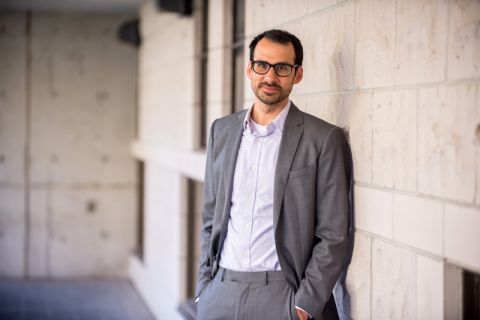
It’s not uncommon to hear about a migrant who commits a crime but, despite having spent most of his or her life in Canada, faces deportation to a country where he or she has barely, if ever, lived in. An example is the recent high-profile case of Abdoul Abdi, a Somali man who came to Canada at age six and spent much of his childhood in group and foster homes, gradually developing an extensive criminal record. After judicial intervention, Abdi’s deportation was not carried out. “Many people will think that was right, morally speaking,” says Professor Colin Grey. “But I am interested in how we (and the government, in this case) come to that conclusion and how the law takes this moral reasoning into account.”
That’s the thrust of Grey’s new research project “Humanitarianism and the Justification of Deportation for Criminality,” which received a SSHRC Insight Development Grant.
“Exploring these kinds of issues is important for thinking about what is morally acceptable or unacceptable in how we govern migration,” he explains. “And thinking about what is morally acceptable and unacceptable in our governance of migration is vital because – pandemic-related restrictions aside – global migration pressures are just going to keep rising in the coming decades.”
His study is about how officials morally justify their decisions to deport non-citizens. Specifically, it looks at cases where officials must consider if there are “humanitarian” and “compassionate” grounds not to deport a non-citizen for having committed a crime. “For a long time, I’ve found it fascinating that Canada’s immigration law has, since 1967, included humanitarian and compassionate exemptions from deportation,” he says. “These exemptions inscribe a certain kind of morality into the law, requiring officials to engage in moral reasoning rather than simply applying the rules. We want to look more closely at how officials apply this humanitarian exemption power.”
Grey has long been concerned with the moral constraints on Canada’s immigration laws, as well as with where the authority of immigration law is supposed to come from. Having argued that the authority of immigration law must come from what the philosopher John Rawls calls the “natural duty of justice,” his claim has been that there is a duty to obey reasonably just immigration laws. “I now think that justice cannot be the only type of moral consideration coming into play when it comes to immigration law’s authority,” he says. “I think humanity must play a role as well. This project is an extension of that line of thought.”
For this project Grey is collaborating with his colleague and fellow immigration law expert, Professor Sharry Aiken, as well as with Alyssa LeBlond, a first-year PhD in Sociology student. Supporting their work as research assistants are Michael Cui, Law’21, and Justin Saunders, Law’22.
“We are going to read hundreds deportation decisions in a way that differs from how you read them for more traditional legal research,” Grey explains. “Without asking about the legal frameworks or consistency with precedent, we will try to clarify how officials weigh things like personal responsibility, remorse, and so on against hardship. The goal is eventually to develop a sociological theory of officials’ moral reasoning. We are then going to compare it to the case law and philosophical writings about immigration. We want to see how these three ways of looking at the justification of deportation compare to one another.”
In the short- and medium-terms, Grey aims to produce not only scholarly publications from this research, but also to write reports to share with the government and immigration lawyers about how deportation decisions are made. His longer-term goals are even more ambitious. “I am hoping this project will serve as a template for doing research on other areas of immigration law, eventually developing an account of how immigration officials constitute the authority of immigration law and using that to nourish philosophical and legal debates in this area.
“But,” he adds, “one thing at a time.”